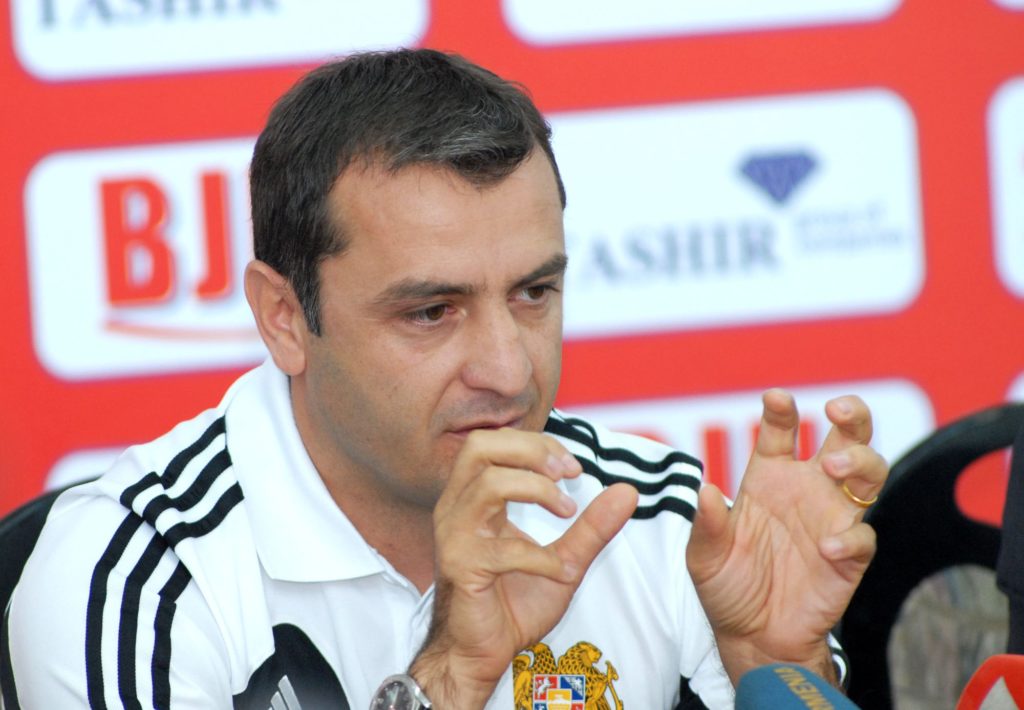
Special to the Armenian Weekly
On April 6, Football Federation of Armenia (FFA) President Ruben Hayrapetyan accepted the resignation of Armenia’s head coach Artur Petrosyan. Although his reign began in Oct. 2016 with a pair of notable wins against Montenegro and Kazakhstan, Petrosyan was unable to build on those early results and could only manage a single point from five competitive fixtures in the remainder of his time at the helm.
It is a very interesting time for the lower ranked nations of UEFA. The creation of the UEFA Nations League, as previously reported on the Weekly, provides lower ranked nations, such as Armenia, a realistic and attainable path to Euro 2020 qualification. Although the regular qualification path still exists, it is generally considered a (very) long shot for lower ranked nations to secure a berth at the finals. The regular format has made it an uphill task for any Armenian manager to attain success i.e. qualification, in every previous tournament cycle (Euros or World Cup). The Nations League offers a real opportunity for success. An opportunity to chart new territory for the national team and as a manager, secure a legacy by securing Armenia’s first final’s appearance.
Unfortunately for Petrosyan, he will not be that man. Coupled with his poor results, the manner in which the team performed under his watch gave him little chance of remaining in the job. Hayrapetyan and the others on the FFA board seemingly recognize the importance of Nations League also. The much maligned and often criticized Hayrapetyan has had more than a few occasions in his tenure as FFA President where his judgement and priorities have been called into question. On this occasion, he and the board have acted decisively. Petrosyan’s manager’s seat was still warm when it was announced on April 10, that Armenia’s prodigal son, Vardan Minasyan was returning to lead the team once again.
It was under Minasyan’s stewardship that Armenia enjoyed its greatest period of (modest) success. During a five year period between 2009 and 2014, Armenia narrowly missed out on qualification to Euro 2012 and World Cup 2014, the team rose to new heights in FIFA’s world rankings, and did so while playing an entertaining and exciting brand of football. With a résumé like that, it is little wonder that many Armenian fans welcome the man back into the fray to begin to pick up the pieces of Armenian’s latest campaign and right the ship once more.
Some criticism could be laid at Minasyan’s feet. It could be argued that he left the Armenian setup in 2014, after two hard fought but ultimately unsuccessful campaigns, at the worst time. The talented crop of young players who he helped cultivate through the youth teams, and mold into a team with a real identity, was poised to take the next step, build on the foundation he had laid. Instead of following that upward trajectory, the team regressed significantly. Minasyan now needs to revive the team’s fortunes once again, a team that has misspent four years of its footballing prime in his absence. Minasyan may have been all too aware of the difficulties in qualifying for tournaments through UEFA’s always stacked group system. Seeking pastures new for himself after building a decent reputation with Armenia, he may have thought was his best opportunity for career advancement. Perhaps, but a short and mediocre spell in Kazakhstan with Tobol FC was probably not what he envisioned. Four years and four Armenian managers later, there is now data that suggests that Minasyan is (and was) the only man for the job.
Taking only competitive qualifying matches into account, and removing friendlies from consideration, the numbers tell an interesting story. After all, it is competitive matches where teams really earn their salt. One sided international friendly results versus lower ranked teamed only help to distort the real picture of the team.

In the four years between 2005 and 2008, Armenia averaged a clean sheet once every eight or nine matches. Armenia also failed to score in two of every three competitive matches played. This is further reflected in a 0.59 average goals scored per match, and a 1.88 average goals conceded per match.
During Minasyan’s most successful four years of his five year tenure, the Euro 2012 and World Cup 2014 campaigns of 2010 to 2013, Armenia averaged a clean sheet once every three games. Armenia failed to score in one of every three competitive matches played. Both statistics showing a marked improvement. Similarly, goals scored and goals conceded numbers improved dramatically to an average of 1.70 goals scored per match and 1.15 goals conceded per match.
The statistics during the post Minasyan era display an interesting symmetry. During the period of 2014 to 2017 Armenia’s results regressed to eerily similar levels to those seen pre-Minasyan. In the last four years, in competitive fixtures, Armenia averaged a clean sheet once every nine matches. And although the number of matches Armenia fails to score in has not regressed quite as dramatically (two of every five played), there has been a dramatic decline in goals scored average and an increase in goals conceded average, 0.83 goals scored per match and 2.22 goals conceded per match. It is pretty hard to win matches when opponents are afforded a two goal cushion.
If Minasyan can recapture the form of his previous time in charge, Armenia will be well positioned to capitalize on the Nations League opportunity. Tournament play begins in Sept. 2018. There will be a busy five months ahead on Minasyan and Armenia.


Be the first to comment